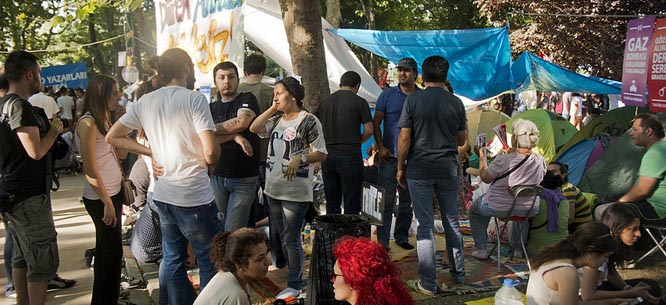Fundamentalists and Businessmen: The Battle for Secular Space
Fundamentalists and Businessmen: The Battle for Secular Space

On June 11, following threats by Turkey’s PM Erdogan that demonstrators who held out would “pay a price,” an overwhelming force of 20,000 riot police, complete with agents provocateurs throwing Molotov cocktails, cleared Gezi Park in scenes reminiscent of Occupy Wall Street. Like OWS, the struggle over the fate of Gezi Park in Taksim Square has been many things. It has been a real struggle over real space. It has been a symbolic struggle over the meaning of democracy. It has been an illustration of the connection between secular space and human rights, including the right to freedom of expression and assembly. And it has been a key moment in highlighting the convergence between neoliberal and “moderate Islamist” agendas.
A public park is a secular space with trees. That’s why Erdogan wants to get rid of Gezi Park, prime real estate in an area marked for gentrification. Privatize public space, turn the city over to the developers, tear down popular coffeehouses and restaurants, close the bars, and leave nowhere for people to go but the mosque.
Erdogan’s agenda is a combination of neoliberal development for the 1 percent and what his party calls “moral and social conservatism” for everyone else. He wants to outlaw abortion and the morning after pill, says every Turkish woman should have three children, and has reverted to the old regime’s persecution of artists and writers, indicting a classical pianist for an atheistic Tweet and putting hundreds of journalists in jail.
For all these reasons, the planned destruction of the park became a flashpoint for the whole country. Like New York’s Union Square, Gezi is the historic site of Mayday celebrations and demonstrations in favor of unpopular causes. The planned redesign will eliminate most pedestrian entrances in favor of car tunnels and replace trees with a shopping mall. Talk about symbolism—you couldn’t make this stuff up.
Gezi Park is one of the few green lungs in Istanbul. Another Erdogan project, a third airport scheduled to be the largest in Europe, will replace most of the forest on the northern side of the city. No environmental assessment or public commentary has been invited on this or other major projects. Erdogan’s democratic theory, like that of Putin and Khamenei, combines elections with authoritarianism: first you win an election and then you get to do whatever you want. The police have defended this theory of democracy with great enthusiasm, killing two people and injuring an estimated five thousand.
A public park embodies a different theory of democracy. A hundred forty years ago the first planned park in the United States was completed by Calvert Vaux and Frederick Law Olmstead, a crusading anti-slavery journalist, conservationist, and co-founder of the Nation. To Olmstead, Central Park was “a democratic development of the highest significance,” a free, green environment in which city dwellers stifled by vistas of endless concrete could reconnect with nature and regenerate mentally and physically.
In this conception of democracy, secularism—the separation of government and religion—is a given. A secular space like Central Park is free to any and all; it is a place where the pious and the apostate can rub noses; where people can play football, read, picnic, or just lie on the grass. In a secular space, there are no dress codes or morality police; itinerant ranters must compete with rap music, and the young are free to kiss one another if they like.
The subway is another secular space, and this too is being contested in Erdogan’s Turkey. The week before the Taksim protest began, two kids were kicked off the Ankara subway for “displaying public affection.” Asking who made the subway system a guardian of public morality, a hundred people staged a “kiss-in” to protest.
Fundamentalists and businessmen prefer spaces that are empty and blank, in which the only messages available come from them. But urban public spaces are messy, noisy, and full of people with conflicting needs. On the New York subway, for instance, citizens are often exposed to displays of public affection more heated than they may find appropriate, not to mention high-decibel music, acrobatic performances, and preachers haranguing them to come to Jesus. These annoyances are the price we pay for freedom of expression; a society in which there was no space for crazed preachers to rant—or where only one variety of crazed preacher could do so—would limit everyone else’s freedom of expression too.
For the last ten years, the United States has been using Erdogan as the poster boy among Muslim leaders, a “modern” Islamist, tolerant of all views and friendly to capital. Lately Erdogan’s tolerance has not been much in evidence, but his friendliness to capital remains. The destruction of Gezi Park is thus a landmark in the convergence between the neoliberal and “moderate Islamist” agendas: rebuild the center city for the rich and tourists, exile the poor to the outskirts, and console them with religion. This agenda also entails cutting back public spending in favor of “faith-based” charity. It is an agenda many in Washington can get behind.
But the Taksim protesters, like Occupy Wall Street, are claiming the right to public spaces that are both green and free—the right to the city. Their demonstrations brought together Kemalists, anarchists, communists, Kurdish nationalists, LGBT activists, and feminists, all uniting against police brutality and religious encroachment to imagine a kind of democracy that goes deeper than periodic elections, a kind of democracy that is continuous and that responds to the needs of the people, not the developers—a vision just as relevant to Russia, Iran, and the United States as to Turkey.
Meredith Tax is chair of the board of the Centre for Secular Space, and a writer and political activist. This post originally appeared on her blog, Taxonomy.






